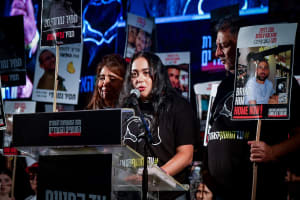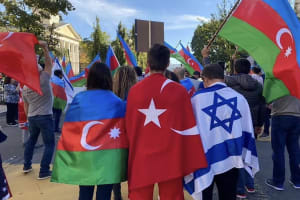As Ramadan approaches – Israel’s choice: Antagonism or appeasement

Considered the most sacred month of the Islamic faith, Ramadan, which will be commemorated from March 10 – April 9, is the time when Muslims are supposed to engage in self-reflection and piety.
While most of us, associate self-reflection and piety with improving one’s standing before God and our fellow man, there is a belief, based on a hadith (collection of traditions containing sayings of Mohammed) that “during the month of Ramadan, the gates of heaven are opened and the doors to hell are closed,” (Bukhari and Muslim) indicating that anyone who dies during this month will go straight to paradise.
Consequently, there is an added incentive for radical Muslims to become a shahid (martyr) over this one-month holiday, since they believe that their death, during this period, will ensure them a blessed eternal inheritance.
It is, therefore, given this backdrop, that Israeli policy is carefully considered as to whether or not extra restrictions should be put into place. This year, that consideration is being looked at with even greater caution, given what occurred on Oct. 7 and still an open wound, fresh in the minds of all citizens.
National Security Minister Itamar Ben Gvir has advocated for there to be “restrictions on Arab Israelis’ access to Al-Aqsa Mosque on Jerusalem’s Temple Mount during Ramadan, despite a report on many Israeli outlets that the decision diverged from the recommendations of parts of the security establishment.” Nonetheless, Ben Gvir’s decision is being backed by Prime Minister Benjamin Netanyahu.
The fear is that this Temple Mount area, which also houses the Al-Aqsa Mosque, two places held in high esteem by both Jews and Muslims – each for their particular following, will be a cause of antagonism for Muslims, if restricted access occurs, at an already sensitive time when the actions of Muslims are being heavily scrutinized in an attempt to avoid further violence.
Indeed, the decision to restrict visitation has infuriated Arab-Israeli as well as left-wing Knesset members who see this as a punitive measure. Presently, the restriction will involve any below the age of 60 and above the age of 10. In response, Knesset member, Ahmad Tibi of the Hadash-Ta’al Arab political party, called the decision “dangerous,” claiming that it constitutes an act of “no freedom of worship for Muslims,”
While Tibi may do his best to blame the more far-right faction of the government, for this security measure, Centrist opposition leader Benny Gantz, who joined the coalition as part of a unity government effort, following the events of Oct. 7th, also agrees with the measure, and given the history of this tinderbox area, it’s not difficult to understand why this year, in particular, could be more problematic than ever.
A look back at previous years, when massacres had not occurred within Israel, responsible for the killing and torture of 1,200 innocents, the compound saw its share of incitement and attack where pro-Hamas rallies took place, emboldening radical Muslims to engage in threatening behavior. Consequently, the area has seen the throwing of “stones, fireworks and Molotov cocktails with hooligans streaming out and attacking the first group of Jews who enter the area at 7 a.m.”
It was just a year ago, that “Muslims barricaded themselves inside the mosque,” following evening prayers, “resulting in the arrest of 400.”
It is this type of provocation, which Israel is trying to avoid, because there is enough inflamed sentiment by pro-Hamas Muslims that does not need further igniting, and that is where the appeasement argument comes in. Labor chairman, Merav Michaeli has been a harsh critic of the decision, choosing to believe that most Muslims will not create havoc and that, in fact, many of them have condemned the events of October 7th.
Warning that restrictions “could likely face legal obstacles,” Attorney General Gali Baharav-Miara “cautioned against the proposal of the National Security Minister, stating that it could inflame the Arab street.”
While there is a concern that such a move could be seen as opposing free access to those whose right it is to pray at a holy site, it should be noted that the Temple Mount, the site considered to be the holiest to Jews, although controlled by Israel, for means of security, is under the management of the Waqf (the Jordanian-appointed organization responsible for controlling and managing the Temple Mount) which highly restricts entrance to Jews, only allowing them access “during certain times, but without permission to pray there in order to avoid provoking interreligious conflict.” So which group is really restricted and denied access as well as freedom of religious observance to the site?
Far-right Otzma Yehudit Minister Amichai Eliyahu went one step further in his interview with the Jerusalem Post when he said, “There is a broader reason to limit Muslim visitation during Ramadan: To stand up for Jews and show ‘who the owner is.’ When Jews show weakness, they are attacked all over the world. Jews in Israel and in the Diaspora should no longer bow to pressure, and Temple Mount visitation is an example where Israel should not stand down. Showing who the landlord is will stop Jew-hatred.”
Added to that was Ben Gvir’s lament, stating: “It can’t be that women and children are hostages in Gaza and we allow Hamas victory celebrations on the Temple Mount.” The question is, “Do all Muslims, who desire to pray on the Temple Mount, support Hamas’ actions of October 7th, and would their unfettered presence to pray at their mosque be viewed as a victory celebration of the recent massacre?” Some say yes, and some say no.
What is clear, however, is that in this two-sided conflict of antagonism or appeasement, one of the sides stands to gain the upper hand, and although both of the arguments have elements of truth and reasonableness, only one can prevail.
In the end, Israel must do what it feels is best for the safety and security of all its citizens, whether Arab or Jewish, because both stand to lose if violence escalates. And, as much as the country claims to allow religious freedom for all, any religious observance that deteriorates into violent attacks must be viewed as no longer protected under the guise of freedom of religion but, rather, called out for what it is, incitement, aggression and a danger to all.
This year, more than ever, that must not be permitted to happen, and certainly not during a time of what is meant to be self-reflection!

A former Jerusalem elementary and middle-school principal who made Aliyah in 1993 and became a member of Kibbutz Reim but now lives in the center of the country with her husband. She is the author of Mistake-Proof Parenting, based on the principles from the book of Proverbs - available on Amazon.














